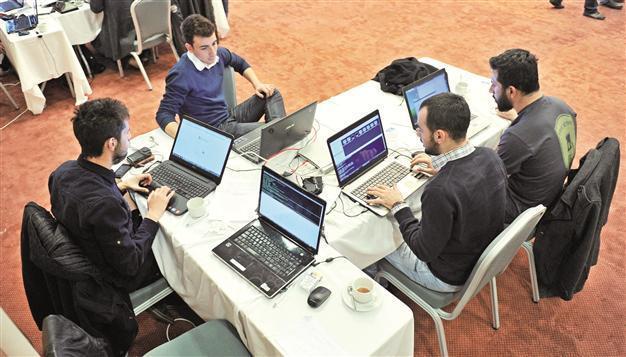Turkey's science watchdog under probe over leaked recordings
Fevzi KIZILKOYUN / Erdinç ÇELİKKAN ANKARA

University students are seen in a competition about encripted documents organized by the TÜBİTAK in this photo.
The revelations of an alleged telephone conversation between Prime Minister Recep Tayyip Erdoğan and his son allegedly proving their graft has raised questions about the reliability of the country’s scientific watchdog, as it is responsible for providing encrypted telephones for senior state and government officials.“It is very interesting; they even tap the state’s cryptic phones from [the Scientific and Technological Research Council of Turkey - TÜBİTAK]. A president cannot speak with a prime minister without being wiretapped at an instant,” Erdoğan said Feb. 25, while arguing that the scandal justified the recent bills that gave more control to the government over the Internet and the intelligence agency and announcing similar measures for TÜBİTAK.
Now, according to the results of an examination launched at the watchdog, the state’s top auditing body may also step in. Upon an order by Science, Industry and Technology Minister Fikri Işık, a wide examination at the institution has been launched, with an expert team assigned the task. The examination has been extended to both the Telecommunications Directorate (TİB) and the Communication Technologies Institution (BTK).
After wiretapping bugs were found in Erdoğan’s office in late December 2011, the Center of Research for Advanced Technologies of Informatics and Security (BİLGEM), working under TÜBİTAK, developed encrypted telephones in 2012. Those phones were tested by the National Intelligence Organization (MİT) before being distributed to senior state and government officials, with MİT saying in a report they could not be wiretapped.
However, the codes to cipher the telephones were allegedly leaked, facilitating wiretapping.
Encrypted telephones use different algorithms for ciphering signals, so it is impossible to wiretap them, officials said. “Wiretapping is possible only if codes are leaked,” an official said.
It has been suggested that may be the reason why Erdoğan drew attention to the alleged responsibility of TÜBİTAK in the affair.
Five personnel working at TÜBİTAK were suspended at the outset of the investigation.
“Claims are being examined with all aspects and there may be suspensions at the senior level of TÜBİTAK at the end of the investigation,” an official from the Ministry of Science, Industry and Technology said.
The five have already been banned from entering the institution. Depending on the results of the investigation, the State Audit Board (DDK), working under the Presidency and the Prime Ministry Inspection Board, may also intervene in the incident.
In his same speech on Feb. 25 which was delivered after the posting of an 11-minute recording on YouTube on Feb. 24, Erdoğan said: “We will bring legal action against these [wiretapping] activities. If we let it go on, there will be no privacy for families nor for the state in this country.” The video has been watched close to 4 million times in 48 hours.
Also on Feb. 24, reports of widespread wiretapping were published by two pro-government newspapers, prompting Erdoğan to describe it as “the biggest eavesdropping scandal in Turkish history.”
According to reports, hundreds of people, including the prime minister, his closest associates, the head of MİT, as well as a number of journalists, scholars and business leaders, have been tapped by prosecutors.
















